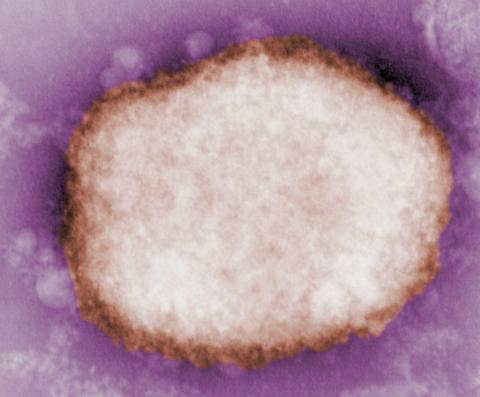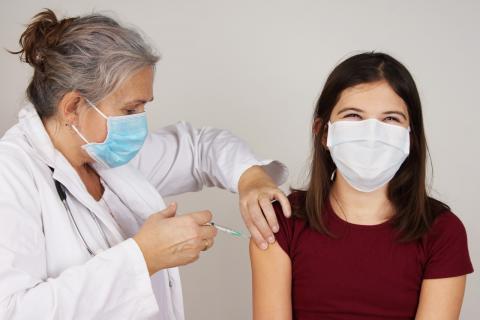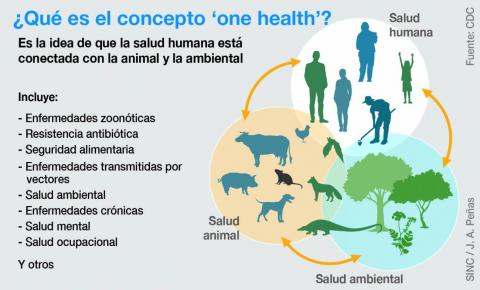What has happened?
On 7 May 2022, the UK detected a case of monkeypox in a patient who had recently travelled to Nigeria. On 14 May, two further cases were announced, with no connection or travel history.
On 17 May, four additional cases were found, with no connection to the previous cases (although two of the four had common contacts) and no travel history.
At the time the head of the UK's Health Security Agency admitted that this was "rare and unusual" and that the evidence suggested there was community transmission.
Are there cases in Spain?
The Ministry of Health confirmed to SMC Spain that, as of 17 May, eight cases had been detected in Spain that "present clinically consistent" with monkeypox (Monkeypox) and have yet to be confirmed following testing. On the evening of 18 May, the Madrid regional health ministry reported that it had detected 23 possible cases of infection.
"In general, transmission is through the respiratory route, but the characteristics of the 23 suspected cases of infection suggest that it has been through contact with mucous membranes during sexual intercourse," the ministry said in a statement. The people under study are progressing positively and are isolated in their homes, although close monitoring should be maintained as they may require hospital admission, according to information provided by the Community of Madrid.
In accordance with the protocol, a national alert has been issued, the Alerts Committee has been informed of the situation and all key players have been notified for a coordinated response. "The Ministry of Health is in permanent contact with the European Alert System to monitor this alert at the global level," the agency said.
For its part, Portugal has confirmed three cases in Lisbon, two are pending confirmation and a further 15 cases are under investigation.
Why are all the cases in men who have sex with men? Is it a sexually transmitted disease?
According to El País, all the suspected and confirmed cases have occurred in men who have sex with men. This does not mean that monkeypox is a sexually transmitted disease or that it only affects men who have sex with men. "By nature, sexual activity involves intimate contact, which increases the likelihood of transmission, regardless of sexual orientation and mode of transmission," Imperial College London (UK) virologist Michael Skinner told SMC UK.
"The fact that several of the cases are among men who have sex with men does not imply that it is a sexually transmitted disease as such," Mar Faraco, president of the Association of Foreign Health Physicians, told SMC.
University of Southampton researcher Michael Head said that "this could be the first documented transmission through sexual contact", although he clarified that this had yet to be confirmed.
UK Health Security Agency epidemiologist Mateo Prochazka said "this new route of transmission will have implications for outbreak response and control". He also stressed the importance of "addressing discourses that reinforce inequalities and stigma".
But what is monkeypox?
Monkeypox virus belongs to the genus Orthopoxvirus, whose most famous member is smallpox (Variola virus), which was declared eradicated in 1980. Since then it has become the most important representative of this type of virus.
How is it transmitted?
Monkeypox has a somewhat misleading name, as it is in fact usually transmitted by small mammals such as rodents (but also by apes). It is so named because it was first detected in laboratory macaques in 1958. Transmission requires direct contact with the blood, fluids or lesions of the animals.
Human-to-human transmission is limited and requires close contact, either with respiratory secretions or skin lesions, a contaminated object or prolonged face-to-face contact allowing infection from respiratory particles. The longest documented chain of transmission is six people.
Where does it come from?
It is an increasingly common disease in West and Central Africa. Since its discovery in 1970, it has been detected in 11 African countries. As is often the case on the continent, the true burden of monkeypox is unknown.
Where does it come from?
It is an increasingly common disease in West and Central Africa. Since its discovery in 1970, it has been detected in 11 African countries. As is often the case on the continent, the true burden of monkeypox is unknown.
The Democratic Republic of Congo, for example, reported 704 cases in the first two months of 2022, of which 37 died. Since January 2020, the African country has reported more than 10,000 infections and 342 deaths. A 2010 study showed how cases had increased in the country after the cessation of smallpox vaccination campaigns.
Is it rare to find cases outside Africa?
Although exports are rare, they have increased in recent years.
The first time cases were found outside Africa was in 2003, when an outbreak in the United States affected 47 people. Its origin was found in prairie dogs that were sold as pets and had lived with Ghanaian animals.
In 2018, isolated cases were found in Israel and the UK. In 2019, in the UK and Singapore. In 2021, in the United States and the United Kingdom. All occurred in travellers from Africa or in toilets.
Why this increase in cases inside and outside Africa?
Studies such as this one published in Nature Medicine in 2005 suggest that people vaccinated against smallpox have some cross-immunity against monkeypox virus. Smallpox was declared eradicated in 1980 and vaccinations had already been slowing down in the previous decade: this means that an increasing percentage of the population has no protection against smallpox and, by extension, monkeypox.
Is it dangerous?
There are two strains: West African and Congo. The West African strain is the one detected in the British cases, the first of which had travelled to Nigeria. It is the less lethal version, with a mortality of around 1%. The Congo strain has a mortality of up to 10% and is probably better transmitted.
Case fatality has ranged from 0-11% in the general population, but is higher in young children and it is believed that the younger population, unvaccinated against smallpox, may be more susceptible. These figures are from developing countries with resource-limited health systems, so are not necessarily extrapolable to other parts of the world.
What are the symptoms?
Symptoms in humans are similar to those of smallpox, but milder. Incubation is usually between 6 and 13 days.
In the first phase there is fever, headache, back and muscle aches, swollen lymph nodes, chills and tiredness. It lasts between 0 and 5 days.
Within 1 to 3 days after the onset of fever, itching begins (usually first on the face) and progresses to typical skin lesions. The disease lasts 2 to 4 weeks.
The Ministry of Health reports that most people recover within several weeks, although severe illness can occur in some cases.
Is there a treatment or vaccine?
At this time, there are no specific treatments available for monkeypox infection, but monkeypox outbreaks can be controlled. The smallpox vaccine is considered effective in preventing infection or making it milder, but these vaccines are no longer in circulation. A newer version against smallpox and monkeypox was approved in 2019, but is not yet available to the general public.
According to the Ministry of Health, treatment is symptomatic and supportive, including prevention and treatment of secondary bacterial infections.
Is there anything to worry about in the current outbreak?
Unlike previous outbreaks, with a few cases associated with travel or one-off exposures (as was the case with prairie dogs), in this case the health authorities are concerned that there is community transmission with undetected infections, both in the UK and elsewhere.
"We are concerned that this is very different from what we typically associate with monkeypox. We have some concern that there may be spread outside the UK," a US CDC official told Stat.
"The general public need not be concerned, but clinicians and public health authorities need to be vigilant to detect infected cases early and limit transmission," the virologist from Imperial College London (UK) reassured the UK's SMC.




